‘The liberation of Auschwitz continues right here, right now, every day’
Almost 200 survivors joined world and community leaders at the former Nazi death, in what may be the last such meeting for a major anniversary
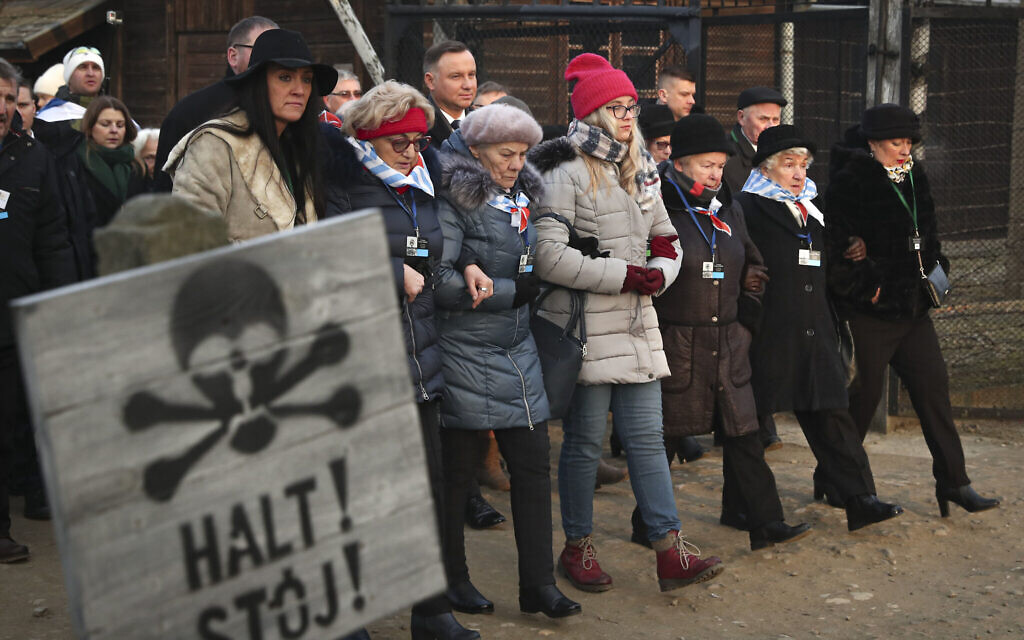
From being reviled as “the people with no human dignity”, what may be the last group of Holocaust survivors marked the 75th anniversary of their liberation from Auschwitz as honoured guests, in a series of emotional events in and around the former death camp.
On Sunday, the eve of the actual anniversary, a restaurant in Poland’s central Krakow was transformed as survivors and their families re-united for a bitter-sweet celebration of their lives. They succeeded where Hitler did not: they outlived the fear and terror of the Nazi regime, rebuilt homes and families, each of them testament to “a little miracle”, and each of them burning with a fierce determination to pass on their message to the next generation.
More than 750 people attended this event, hosted by the Auschwitz-Birkenau Memorial Foundation, headed by the World Jewish Congress president, Ronald Lauder. Britain’s JRoots played a major part in the proceedings, working with the Foundation to bring almost 200 survivors to the 2020 Polish events.
Get The Jewish News Daily Edition by email and never miss our top stories Free Sign Up
Rabbi Naftali Schiff, JRoots’ director and founder, said: “The feelings are palpable and mixed. There is a genuine deep feeling of life, positivity and decency that somehow conquers all — mixed so deeply with the tears and the loss of loved ones. I am looking into the eyes of octogenarians and nonagenarians as we edge mile by mile towards Auschwitz-Birkenau. Pride mixed with sorrow; hope with frustration. Above all, there is an enormous energy and response not only of “never again”, but that “we shall overcome”.
On every table there were survivors, some in wheelchairs, some agile; on one table four generations of a family which sprang from one survivor, celebrated life in the face of death. Surely the youngest of all those present was Angela Orosz, born in Auschwitz on December 21 1944. Today she lives in Montreal, Canada, and credits her survival to “my mother’s strength, her persistence.”
Now Mrs Richt, she is the daughter of Hungarian Jews who were deported in 1944, arriving in Auschwitz on May 25 of that year. Her father, a lawyer, had already been murdered by the time she was born in Auschwitz Birkenau barrack C. The following month, on the day of liberation itself, another baby was born in the camp and Angela’s mother Vera, nursed both children as the boy’s mother had no milk. Both Angela and the other child survived and remain in touch. For her, she said, “Auschwitz is the place where I was born… but when I walk there, I am scared to step on the ground. Maybe someone’s blood, someone’s ashes, someone’s tears, someone’s murdered body is under the earth”.
She could not, of course, remember the horrors of Auschwitz for herself. But there were plenty of memories from the now elderly men and women, who had been children and teenagers in that camp and numerous others: memories of work details and shootings, of thoughtless or deliberate cruelty, of bodies piling up.
Michael Bornstein was just four when he was liberated, but he still retains some powerful memories of his time in Auschwitz. “I was prisoner B1148”, he said, recalling being tattooed and horrifically, the overwhelming smell of burning flesh in the camp. “They say,” he declared defiantly, “that this is the last time so many survivors will be in one place. I say, never underestimate a survivor”. His daughter, Debbie Holinstat, spoke of “the awesome responsibility and privilege of being on the front line of remembrance”.
Mr Bornstein triumphantly brandished a kiddush cup, successfully retrieved after liberation from his family’s buried treasures. The cup has played a role in all his family’s subsequent celebrations, a symbol of what father and daughter called “a response to the Holocaust — to rebuild”.
Ralph Hackman is now 95, but his memories are clear as day. He grew up in Radom, about 120 kilometres from Warsaw, a town of 90,000 of whom around 38,000 were Jews. Thirty-five thousand of Radom’s Jews died in Treblinka, and he is one of the 3,000 from his town who survived. At his mother’s frantic urging, he turned himself in to the police from his safe hiding place in order to save one of his sisters and her three-year old daughter.
He recalled his first days in Auschwitz: “I was processed, tattooed…every day there were between 20 and 25 people dead in my barracks. Every minute of every day I was fighting to stay alive. I probably saw thousands die in front of my eyes.”
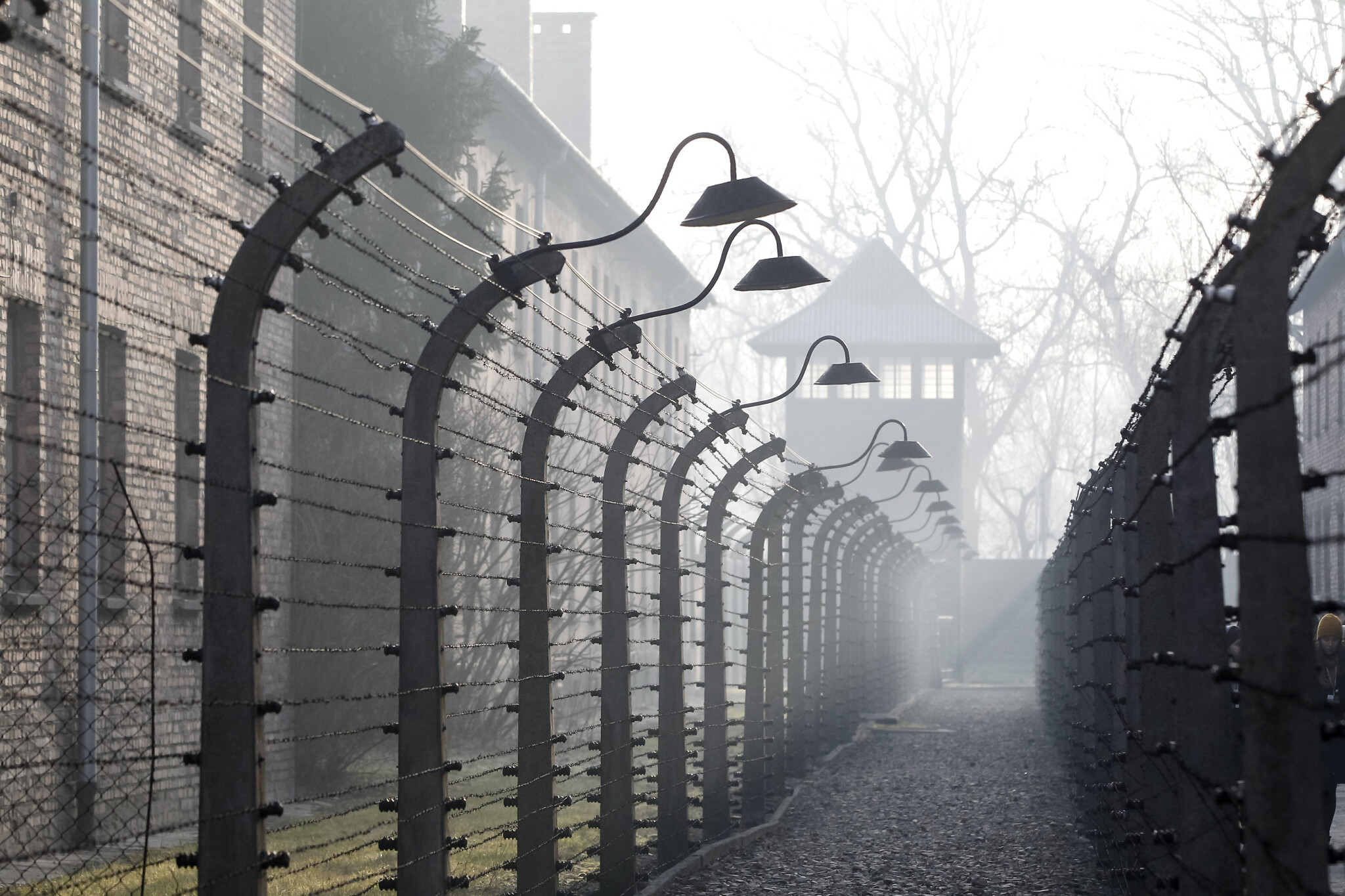
He spoke almost casually of the day Nazi chief Heinrich Himmler came “to visit the crematoria”. Like many survivors, Mr Hackman, who lives today in Los Angeles, did not speak about his experiences until comparatively recently, persuaded into revisiting his tragic past by his granddaughter who was studying the Holocaust. Now he visits schools and campuses, urgently passing on the message to the next generation, the message of vigilance in the face of approaching evil.
Delegations of Jewish communities from 48 countries attended the Auschwitz-Birkenau Memorial Foundation event. Though the formal proceedings featured such high-profile figures as the Ukrainian president, Volodymyr Zelensky, who called the survivors “strong and incredibly courageous”, the emphasis was firmly on the survivors themselves and their testimony and their urgent need to bear witness.
The vital importance of memory was underlined by London’s mayor, Sadiq Khan, who has pledged a donation from the capital of £300,000 to help in the work of the Auschwitz-Birkenau Memorial Foundation. Mr Khan, whose first visit this was to Auschwitz as mayor (he went with the Holocaust Educational Trust while still an MP), spoke repeatedly of “our need to be vigilant — we must not be complacent” — in the face of the renewal of creeping antisemitism in Britain and elsewhere.
Walking towards a memorial wall at Auschwitz which records donations from cities and countries for the preservation of the camp and its museum, Mr Khan naturally and unselfconsciously held hands with Renee Salt, 90, the only British survivor of the death camp present. (Hannah Lewis, who also attended the commemorations, and is on the board of the Holocaust Educational Trust, is a survivor from a small sub-camp in Poland, Adampol, not far from Sobibor).
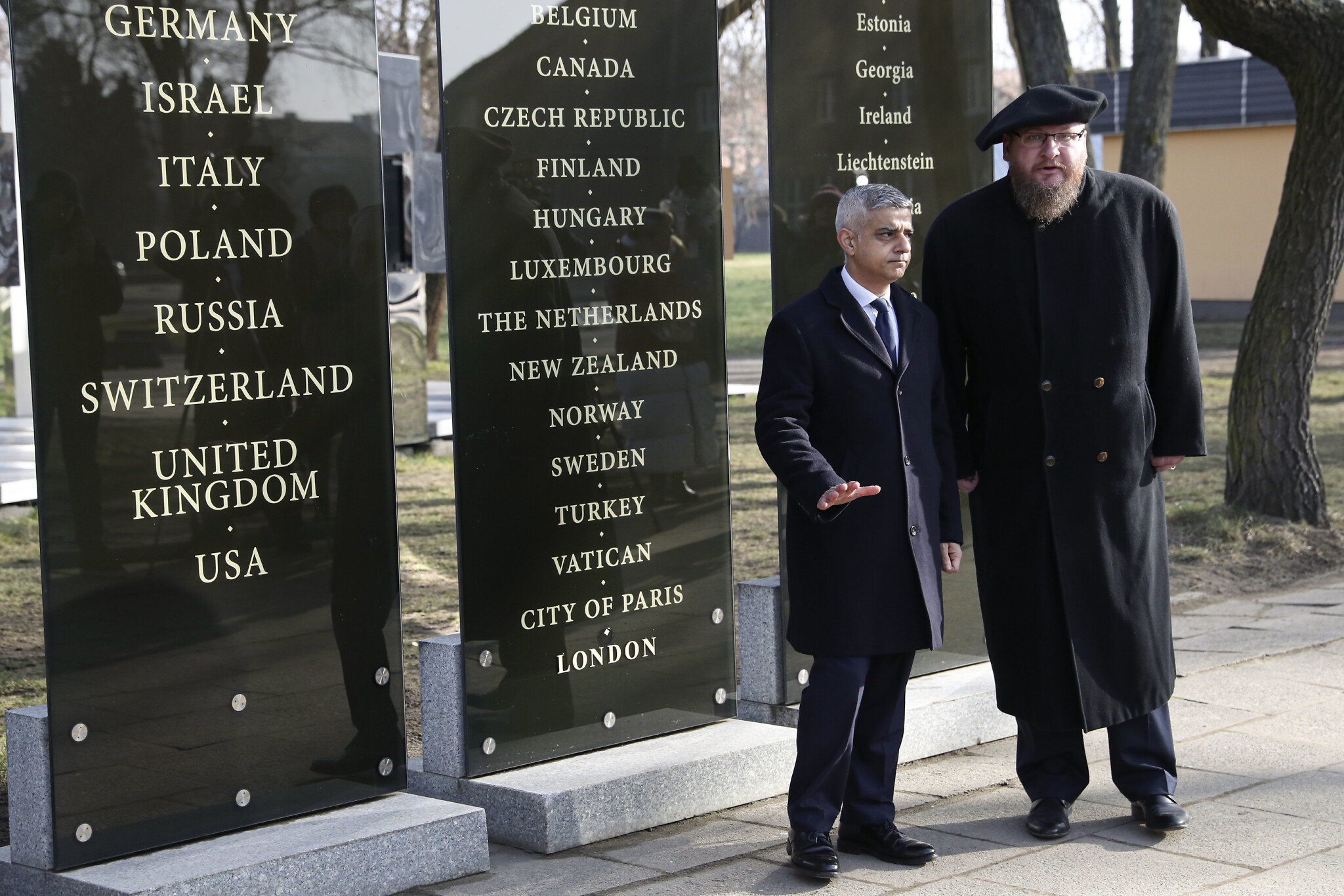
The pain of her time in Auschwitz was plain to see on Mrs Salt’s face. She was a teenager when she was in the camp, and has courageously revisited it many times in the last several years, bravely re-telling of her suffering so that young people can listen and learn from her story. But she believes that this visit will be her last: it is too much of a strain on her emotionally. To call someone “game” for reliving appalling agony seems almost primitive as a response; yet Mrs Salt, drawing on emotional reserves most people can only guess at, readily spoke to TV, radio and print reporters, recalling her arrival at Auschwitz when her father jumped off the train — and she never saw him again.

The stripped-down commemoration ceremony of Auschwitz’s liberation 75 years ago was notable, again, for its emphasis on the survivors, despite the glittering presence of presidents and royalty. Israel’s president, Reuven Rivlin, was there but did not speak; Camilla, Duchess of Cornwall, represented Britain and was joined in the audience by European royalty and other heads of state.
President Andrzej Duda, hosting the event, said that those present had “an obligation to you who have survived, and to future generations”. He said: “We are speaking about numbers, but they represent people, their life stories and their suffering. We are in the factory of death, where there was a mass, methodical murder.” The “industrial nature of the crime” was hard to comprehend, Mr Duda said, “but we must not look away from it and we must never forget it”.
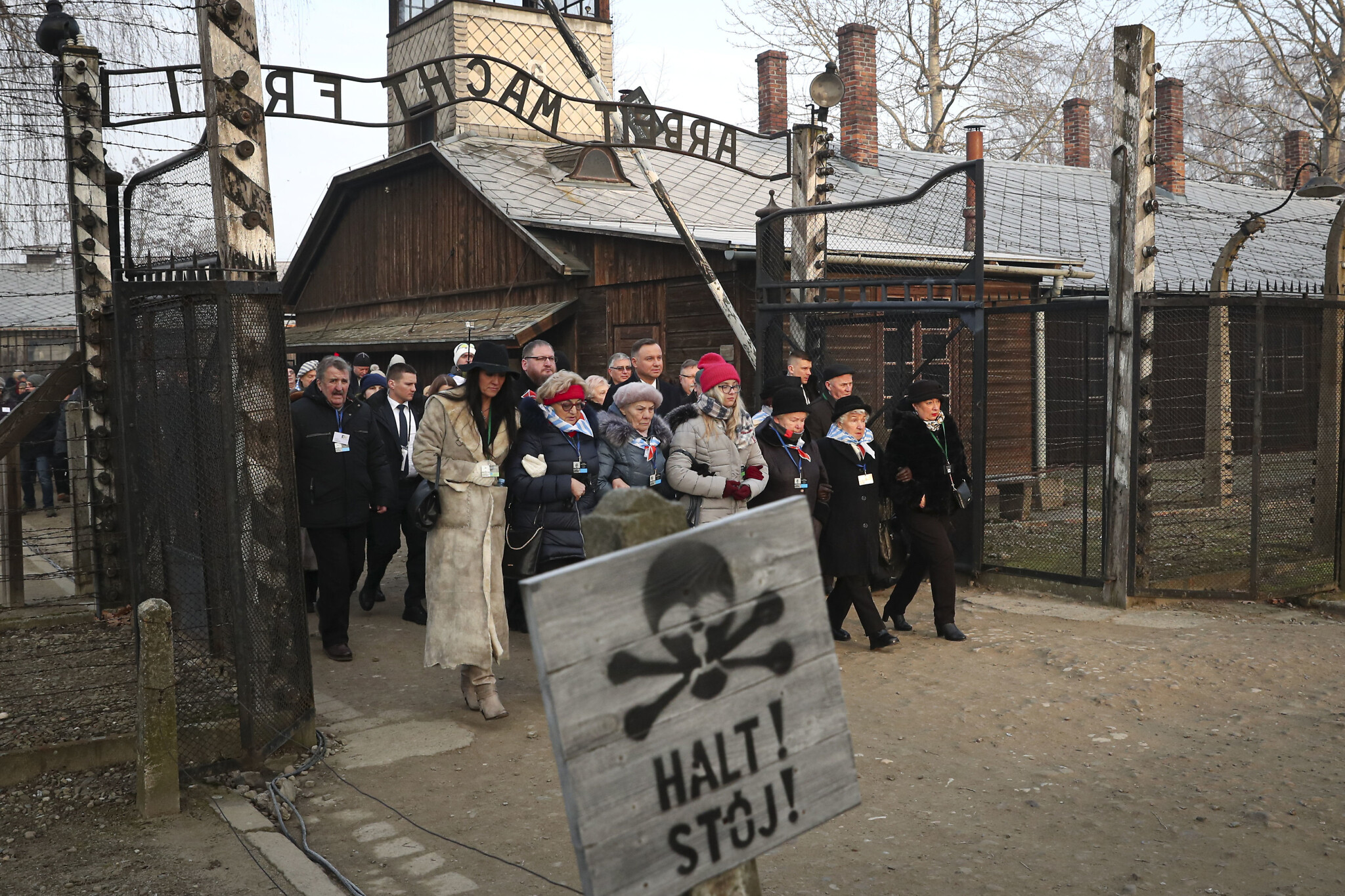
The Polish president, together with President Rivlin and the German president, Frank-Walter Steinmeier, World Jewish Congress president Ronald Lauder and more than 50 other world leaders, walked beside the railway tracks from the entrance of Birkenau to the memorial built at the ruins of the crematoria, where they lit memorial candles.
It was left to Mr Lauder to articulate the lessons of Auschwitz 75. He told the audience that it was vital to advance Holocaust education before it was too late, in the face of the increasing rise in antisemitism. He said: “Seventy-five years ago today, when Soviet troops entered these gates, they had no idea what lay behind them. And since that day, the entire world has struggled with what they found inside.”
Mr Lauder, who initiated the Auschwitz-Birkenau Memorial Foundation, mindful of the importance of preserving and maintaining the site, implored world leaders not to be silent or indifferent. “There are representatives of 40 nations here with us today, and we, the Jewish people, are so grateful that you have joined us. You are good, decent people. But because of where we are, and what this place means, your governments must stand up to this new wave of hatred”.
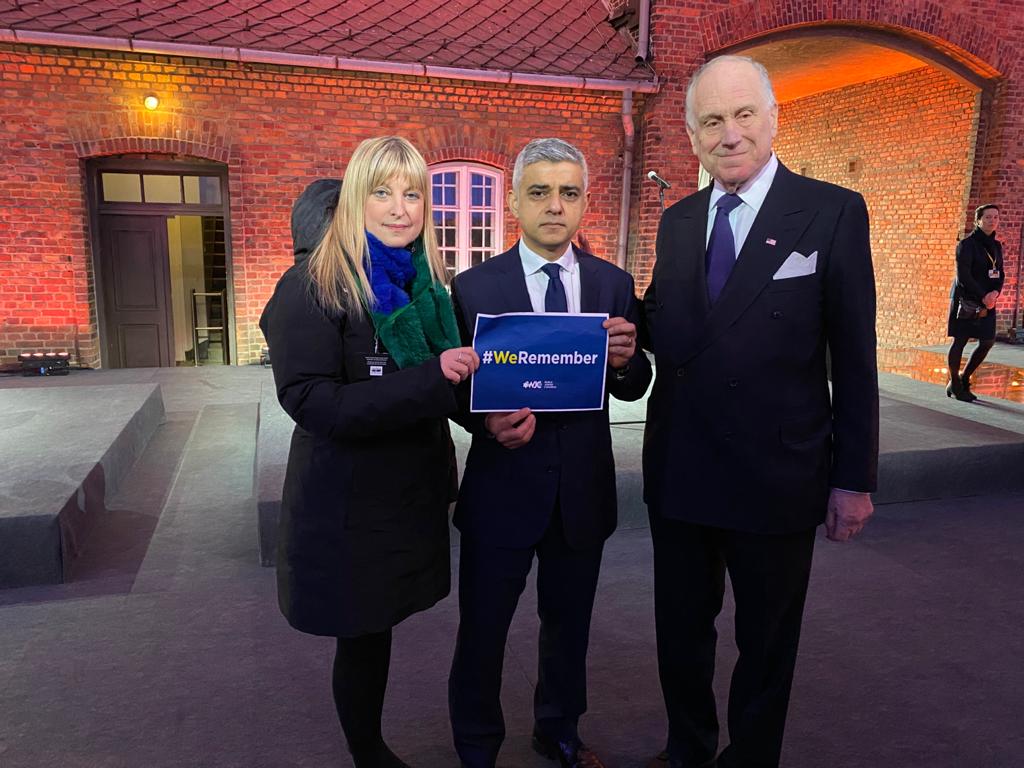
In a clear reference to Iran, Mr Lauder said that “any country which openly brags about the annihilation of another country should be excluded from the family of nations. Every government must have absolutely zero tolerance for hate of any kind. Unless this is checked right now, it will be too late”. World silence, he said, had led to Auschwitz, and he urged: “Do not let this happen again”.
Auschwitz survivor Marian Turski agreed with Mr Lauder. He said pointedly: “Auschwitz did not fall from the sky.” The camp and its horrors only existed as a result of world indifference to antisemitism and discrimination.
The director of the Auschwitz State Museum, Piotr Cywinski, tersely asked: “Where and why did we squander our basic fundamental values? When will Auschwitz become a reality that has been overcome and liberated? In the very essence of the cry of ‘never again,’ the liberation of Auschwitz continues right here, right now, every day.”
After a ceremonial blowing of the shofar, Chazan David Wisnia, a member of the Auschwitz-Birkenau Memorial Foundation’s survivor delegation, recited El Maleh Rahamim, and invited participants to join him in the Mourner’s Kaddish.
What was largely witnessed at the Auschwitz 75 events was a passing-on of the torch of memory to the next generation. Determination and recollection will now be the focus, even when the survivors have gone.

Thank you for helping to make Jewish News the leading source of news and opinion for the UK Jewish community. Today we're asking for your invaluable help to continue putting our community first in everything we do.
For as little as £5 a month you can help sustain the vital work we do in celebrating and standing up for Jewish life in Britain.
Jewish News holds our community together and keeps us connected. Like a synagogue, it’s where people turn to feel part of something bigger. It also proudly shows the rest of Britain the vibrancy and rich culture of modern Jewish life.
You can make a quick and easy one-off or monthly contribution of £5, £10, £20 or any other sum you’re comfortable with.
100% of your donation will help us continue celebrating our community, in all its dynamic diversity...
Engaging
Being a community platform means so much more than producing a newspaper and website. One of our proudest roles is media partnering with our invaluable charities to amplify the outstanding work they do to help us all.
Celebrating
There’s no shortage of oys in the world but Jewish News takes every opportunity to celebrate the joys too, through projects like Night of Heroes, 40 Under 40 and other compelling countdowns that make the community kvell with pride.
Pioneering
In the first collaboration between media outlets from different faiths, Jewish News worked with British Muslim TV and Church Times to produce a list of young activists leading the way on interfaith understanding.
Campaigning
Royal Mail issued a stamp honouring Holocaust hero Sir Nicholas Winton after a Jewish News campaign attracted more than 100,000 backers. Jewish Newsalso produces special editions of the paper highlighting pressing issues including mental health and Holocaust remembrance.
Easy access
In an age when news is readily accessible, Jewish News provides high-quality content free online and offline, removing any financial barriers to connecting people.
Voice of our community to wider society
The Jewish News team regularly appears on TV, radio and on the pages of the national press to comment on stories about the Jewish community. Easy access to the paper on the streets of London also means Jewish News provides an invaluable window into the community for the country at large.
We hope you agree all this is worth preserving.
-
By Laurent Vaughan - Senior Associate (Bishop & Sewell Solicitors)
-
By Laurent Vaughan - Senior Associate (Bishop & Sewell Solicitors)
-
By Laurent Vaughan - Senior Associate (Bishop & Sewell Solicitors)
-
By Laurent Vaughan - Senior Associate (Bishop & Sewell Solicitors)





















